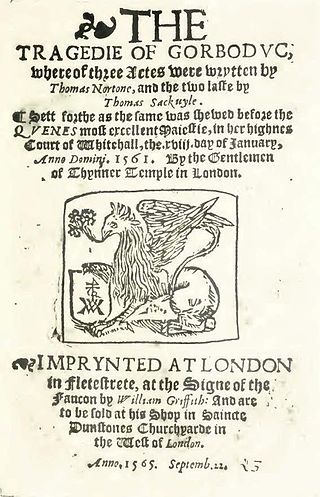Related Research Articles

Uther Pendragon (Brittonic), also known as King Uther, was a legendary King of the Britons and father of King Arthur.

Locrinus was a legendary king of the Britons, as recounted by the 12th-century chronicler Geoffrey of Monmouth in his Historia Regum Britanniae. He came to power in 1125BC.
Mempricius was a legendary king of the Britons, as recounted by Geoffrey of Monmouth. He came to power in 1060BC. He was the son of King Maddan, brother of Malin, and father of king Ebraucus.
Marganus was a legendary king of the Britons as accounted by Geoffrey of Monmouth. He came to power in 850BC.
Cunedagius was a legendary king of the Britons, as recounted by Geoffrey of Monmouth. He came to power in 850BC.
Kimarcus was a legendary king of the Britons according to Geoffrey of Monmouth. He was the son of Sisillius I. and was succeeded by Gorboduc. Geoffrey has nothing to say of him beyond this.

Gorboduc was a legendary king of the Britons as recounted by Geoffrey of Monmouth. He was married to Judon. When he became old, his sons, Ferrex and Porrex, feuded over who would take over the kingdom. Porrex tried to kill his brother in an ambush, but Ferrex escaped to France. With the French king Suhardus, he invaded Britain, but was defeated and killed by Porrex. Porrex was killed in revenge by his own mother Judon, then the high strata of society killed his mother and then there was a war between high strata and low strata leading to an anarchy in the society. This anarchy led to civil war denouncing Gorboduc. Geoffrey does not state when Gorbuduc died, but he is not mentioned after the account of the strife between his sons.
Ferrex was the son of the legendary king Gorboduc of the Britons, and fought with his brother Porrex for the throne, according to Geoffrey of Monmouth.
Dyfnwal Moelmud was accounted as an early king and lawmaker among the Welsh, credited with the codification of their standard units of measure. He also figures as a legendary king of the Britons in Geoffrey of Monmouth's pseudohistorical History of the Kings of the Britons.
Catellus was a legendary king of the Britons, as recounted in Geoffrey of Monmouth's work Historia Regum Britanniae. He came to power in 269 BC.
Millus was a legendary king of the Britons as recounted by Geoffrey of Monmouth. His father was King Catellus and was succeeded by his son, Porrex II.
Porrex II was a legendary king of the Britons as recounted in Geoffrey of Monmouth's Historia Regum Britanniae. He came to power in 257 BC.
Cherin was a legendary king of the Britons as recounted in Geoffrey of Monmouth's Historia Regum Britanniae. He came to power in 251 BC.

Historia regum Britanniae, originally called De gestis Britonum, is a pseudohistorical account of British history, written around 1136 by Geoffrey of Monmouth. It chronicles the lives of the kings of the Britons over the course of two thousand years, beginning with the Trojans founding the British nation and continuing until the Anglo-Saxons assumed control of much of Britain around the 7th century. It is one of the central pieces of the Matter of Britain.
Thomas Norton was an English lawyer, politician, writer of verse, and playwright.
Arvirargus or Arviragus was a legendary British king of the 1st century AD, possibly based upon a real person. A shadowy historical Arviragus is known only from a cryptic reference in a satirical poem by Juvenal, in which a giant turbot presented to the Roman emperor Domitian is said to be an omen that "you will capture some king, or Arviragus will fall from his British chariot-pole".

The Tragedie of Gorboduc, also titled Ferrex and Porrex, is an English play from 1561. It was first performed at the Christmas celebration given by the Inner Temple in 1561, and performed at Whitehall before Queen Elizabeth I on 18 January 1561, by the Gentlemen of the Inner Temple. The authors were Thomas Norton and Thomas Sackville, said to be responsible for the first three acts, and the final two, respectively.

Lucy Toulmin Smith (1838–1911) was an Anglo-American antiquarian and librarian, known for her first publication of the York Mystery Plays and other early works.
John Higgins was an English cleric, poet and linguist. He is now best known as a contributor to the Mirror for Magistrates series of poetry collections.
References
- ↑ Monarchie Nobelesse website, Bretons
- ↑ Geoffrey of Monmouth (1982): The History of the Kings of Britain, translated with an Introduction by Lewis Thorpe, Guild Publishing London, p. 88